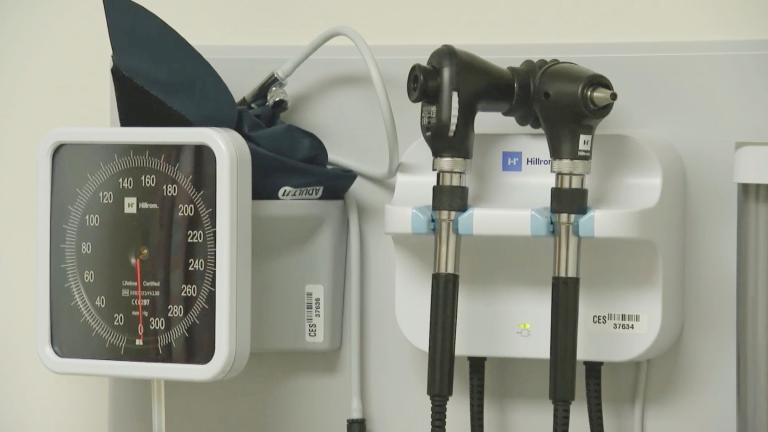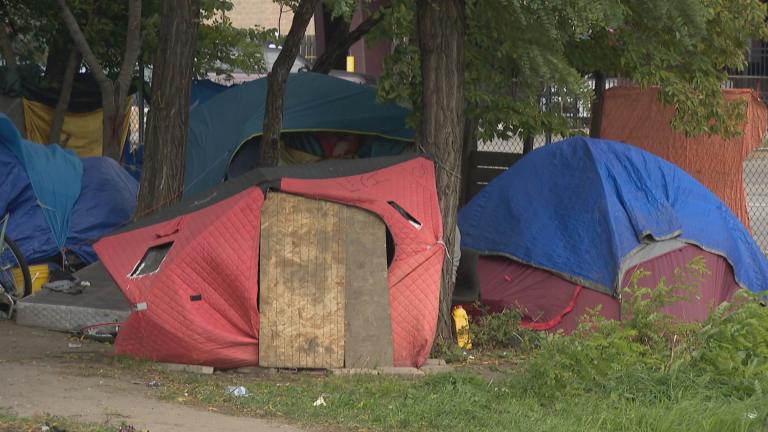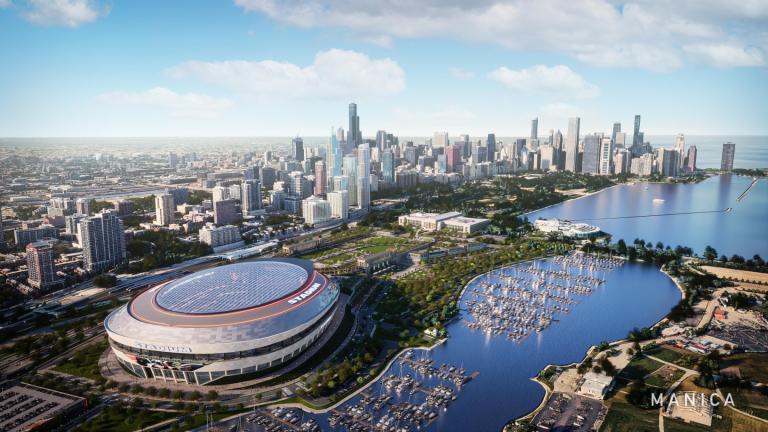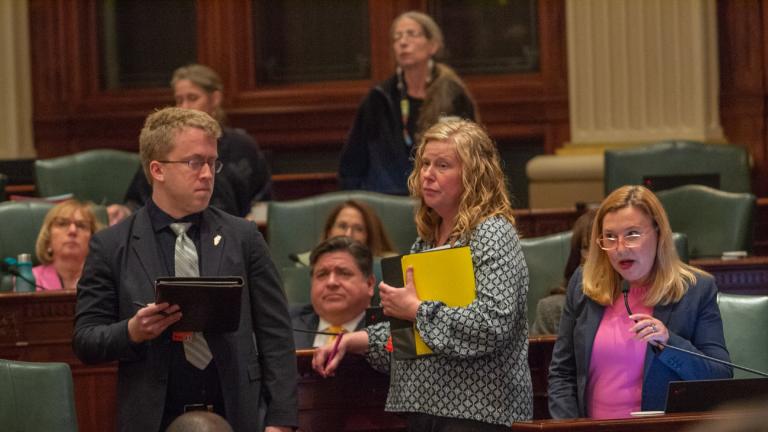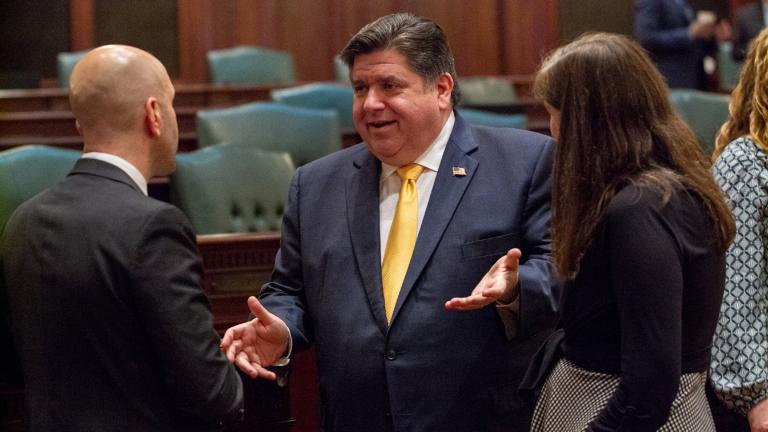Gov. J.B. Pritzker on Wednesday unveiled a $52.7 billion budget that he described as filled with “hard choices.” The plan builds on priorities like funding preschool, supporting Black residents, funding the neediest schools and caring for asylum seekers.
“I wish we had big surpluses to work with this year to take on every one of the very real challenges we face,” Pritzker said inside the ornate Illinois House chambers Wednesday during his annual combined budget and state of the state address. “It’s important to note, that while this budget is tight this year, our fiscal house is in order, and we are able to keep our commitments to the people of Illinois.”
The plan calls for committing $182 million for assistance to Latin American migrants who continue to arrive in Chicago by way of Texas, and makes moves to assuage credit agencies with a constant eye on Illinois’ pensions.
Pritzker also proposes creating a small tax credit for low-income families with children under 3 and adding staff in Illinois prisons and the Department of Children and Family Services — priorities that are supported by some of Pritzker’s key Democratic constituencies and many GOP legislators.
Left unsaid during his nearly hour-long speech was how he plans to pay for it all — namely through taxes on businesses and on betters who place wagers through sports books. The omission was noted by Republicans who reject the description of the budget as tight given that it spends $2.3 billion, or 4.5%, more than the current year’s enacted spending plan. State Rep. Norrine Hammond (R-Macomb) called Pritzker’s proposal the “largest budget in the history of the state of Illinois.
“The governor completely sidestepped the billion of dollars in tax increases that he is relying on for this year’s proposed budget,” Hammond said. “Instead of proposing any substantive cuts to address the projected deficit, the governor is again asking the taxpayers of Illinois to foot the bill so that he can cater to his core constituencies.”
The latest projections from the Governor’s Office of Management and Budget, which were published in November, estimated a shortfall of $891 million.
Pritzker’s budget director Alexis Strum told reporters that a lot has changed since then, and the revenue picture is rosier than expected, but the business and wager tax hikes that Strum referred to as “revenue adjustments” will also fill that hole.
Relying on the relatively oblique revenue sources is a shrewd political move, heading into an election year that will have Pritzker hosting the Democratic National Convention in Chicago.
The tax increases wouldn’t hit the general public. The bulk of the revenue increases deal with obscure formulas for businesses, like raising $526 million by extending a cap on the deduction corporations can take for net operating losses and raising $101 million by retooling a policy that lets retailers keep a portion of the sales tax they collect when shoppers buy items. It’s meant to serve as a reimbursement for retailers collecting the tax on the state’s behalf. Pritzker proposes limiting to $1,000 the amount of sales tax that retailers can keep.
“The retail discount is a partial reimbursement to the hard-working retailers across Illinois who collect sales taxes on behalf of state and local governments,” Illinois Retail Merchants Association president Rob Karr said. “This proposal does not just target large retail stores but would impact retailers of all sizes, from independent grocers to the corner hardware store.”
Pritzker is also looking to gamblers who partake in the rising popularity of betting on sports. He proposes raising $200 million by increasing the tax on wagers placed at sports books from 15% to 35%, a move sure to meet pushback from the industry.
Video: State Sen. Omar Aquino (D-Chicago) joins “Chicago Tonight: Latino Voices” on Feb. 22, 2024, to discuss Gov. J.B. Pritzker’s budget plan. (Produced by Emily Soto)
Another $175 million would be freed up from the state’s general funds, by shifting mass transit costs to come from the state fund that pays for road projects.
Industries that benefit from road construction, including unions and asphalt companies, said the change fails on two fronts: It doesn’t provide enough money for mass transit agencies that have been hurting since the pandemic, and it will result in less money for road and bridge repairs.
In a joint statement, the leaders of the Transportation for Illinois Coalition, Patrick Hosty of the Chicago Laborers District Council-LMCC and Illinois Asphalt Pavement Association vice president Kevin Burke said: “We cannot support this proposal and ask the Legislature to reject any plans that pit transportation needs against each other. What this proposal does is take money away from other transportation needs, making it impossible to deliver on the promise of sustainable transportation for all modes of transportation.”
Other critics said they’re disappointed for what the spending plan didn’t include.
The Illinois Association of Rehabilitation Facilities complains there’s no money to provide better hourly wages for underpaid workers who assist individuals with severe intellectual and developmental disabilities, resulting in “a significant step backwards in our ability to provide competitive wages and benefits for frontline staff.”
Strum described the spending plan, which would take effect for a year starting in July, as “austere.”
There’s fodder for the campaign trail with new initiatives, even if many of the fresh programs Pritzker is plugging would be rolled out modestly. For example, $1 million for a pilot to distribute diapers through the Illinois Department of Human Services wouldn’t go far statewide.
Other new initiatives include: spending $10 million to wipe out some of the $1 billion of private medical debt dragging down low-income families, piggybacking off of program instituted by Cook County; investing a half-billion dollars to make Illinois a quantum computing hub; and making a commitment to decreasing Black maternal mortality rates.
The budget includes $12 million for a new child tax credit for low-income working families with kids under 3 — a drastically scaled-back version of the $300 per child progressive lawmakers were pressing Illinois to institute.
State Rep. Jeff Keicher (R-Sycamore) said it felt like Pritzker was pandering to minority communities in Chicago and Cook County with programs like $50 million devoted to, as the governor described it, “attack the root causes of housing insecurity for Black Illinoisans.”
In contrast, Keicher said there was no mention of addressing problems plaguing rural Illinois, or heeding calls from downstate families to increase the estate tax deduction on family-owned farms.
“One of my frustrations that I’ve had is each and every year we continue to expand additional programs instead of honoring obligations that we already have to things like Meals on Wheels for seniors, assisted care facility costs, adults with disabilities,” Keicher said. “We have made obligations decades ago to Illinois current residents that are our most needy, and we continue to walk away from them in favor or new and expensive programs that aren’t really things that need to happen today.”
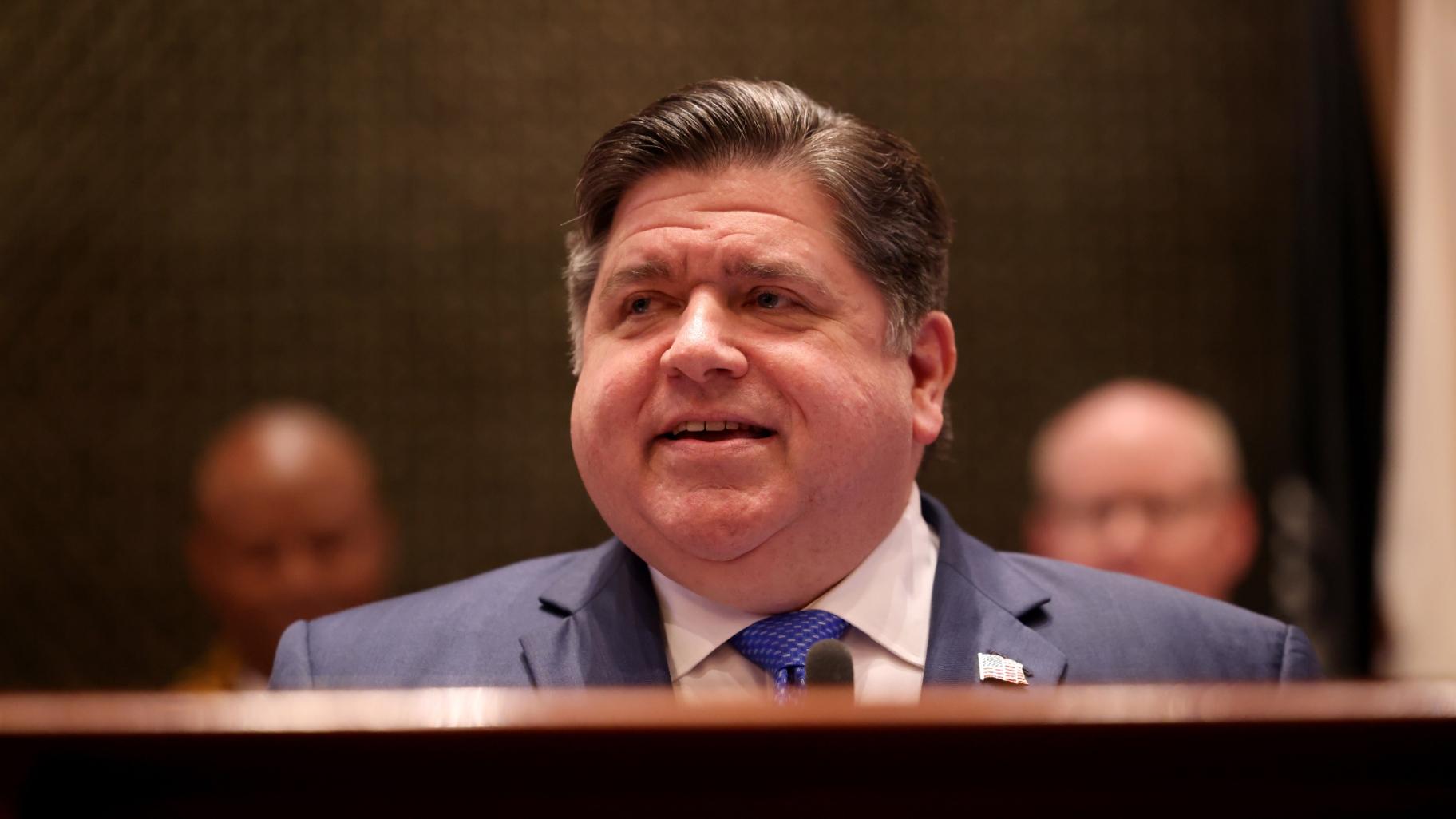 Gov. J.B. Pritzker delivers his state of the state and budget address before the General Assembly at the Illinois State Capitol, Wednesday, Feb. 21, 2024. (Brian Cassella / Chicago Tribune / pool)
Gov. J.B. Pritzker delivers his state of the state and budget address before the General Assembly at the Illinois State Capitol, Wednesday, Feb. 21, 2024. (Brian Cassella / Chicago Tribune / pool)
One of the more controversial aspects of the budget is the $182 million Pritzker publicly pledged last week in response to the influx of asylum seekers. Leaders say that amount, combined with funding from Cook County and potentially the city of Chicago, is enough to cover the crisis through the end of the calendar year.
Pritzker used amplified rhetoric to make his case for the funding, chastising Illinois’ three Republican members of the U.S. House of Representatives for recently voting down a federal immigration overhaul “because Donald Trump told them to, and they’re afraid of him.” Pritzker also reprimanded Texas Gov. Greg Abbot for transporting nearly 36,000 asylum seekers to Chicago.
“Children, pregnant women and the elderly have been sent here in the dead of night, left far from our designated welcome centers, in freezing temperatures, wearing flip flops and T-shirts. Think about that the next time a politician from Texas wants to lecture you about being a good Christian,” Pritzker said to loud applause from Democratic lawmakers. “Listen, maybe some of you think we should just say, ‘This is not our problem,’ and that we should let the migrant families starve or freeze to death. But that’s not what decent Midwesterners do. That’s not what leaders do. We didn’t ask for this manufactured crisis. But we must deal with it all the same.”
However, Democratic reluctance has so far kept the General Assembly from approving the $160 million Pritzker diverted from this year’s budget in November to spend on the migrant response. It’s expected he’ll have to negotiate to get members of his party on board with the additional $182 million, given that members of the minority party are openly hostile to the idea.
State Sen. Jil Tracy (R-Quincy) said she was offended by the religious remark.
“This idea of helping people who force their way into this country, you know trying to shame us that we’re not Christian enough — which was very offensive to me — I have constituents that I have a duty to represent, and they’re taxpayers, and this money is going to be raised at their cost,” Tracy said. “One billion dollars for the crisis that they didn’t ask to be part of is just a little hard to swallow when they’re trying to raise families in Illinois.”
She said it shows that Pritzker’s priorities “are not with Illinois citizens.”
Tracy also said she was also disappointed that property tax relief was absent.
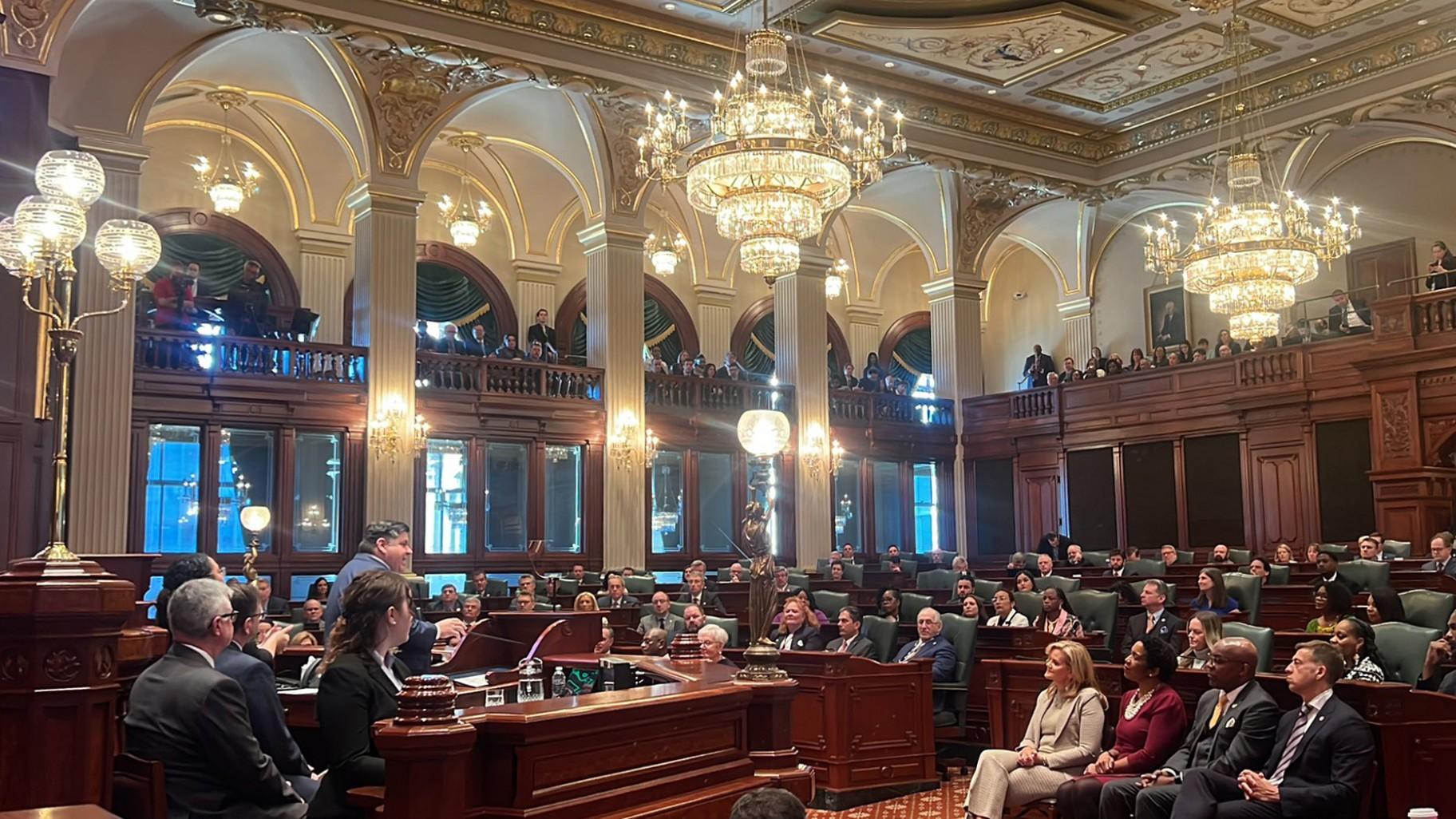 Gov. J.B. Pritzker delivers his annual state of the state and budget address on Feb. 21, 2024. (Amanda Vinicky / WTTW News)
Gov. J.B. Pritzker delivers his annual state of the state and budget address on Feb. 21, 2024. (Amanda Vinicky / WTTW News)
Another plank in the Pritzker’s budget — supported by the GOP — could further strain property taxes.
Ahead of the 2022 election, Democrats voted for a one-year suspension of the 1% tax on groceries, such that a family would save $1 on a $100 bill.
A year and a half since the grocery tax was reinstated, Pritzker wants to eliminate that tax permanently.
“Even though inflation continues to cool off,” Pritzker said, “folks are still feeling the squeeze every week at the grocery store. It’s one more regressive tax we just don’t need. If it reduces inflation for families from 4% to 3%, even if it only puts a few hundred bucks back in families’ pockets, it’s the right thing to do.”
Doing away with the tax won’t ding the state’s bank account. The tax goes to cities, which otherwise depend mostly on property taxes.
“Frankly, it’s an insult to every local government that is providing important services to residents,” Illinois Municipal League CEO Brad Cole said. “To make matters worse, we weren’t even informed of this change in advance. It’s yet another cut for local revenues at the same time municipalities are given more and more unfunded mandates and less and less cooperation. At some point we are going to have to tell every mayor to leave the keys to City Hall on their desk and let the state come in and try to operate local government.”
Pritzker said he’s willing to work with any legislator who has an idea.
“My one line in the sand is that I will only sign a budget that is responsibly balanced and that does not diminish or derail the improving credit standing we have achieved for the last five years,” Pritzker said.
Other moves by Pritzker are more expected.
He’s asking the legislature to increase K-12 education funding by $350 million, the minimum required by a funding formula that prioritizes the neediest districts, and he wants lawmakers to give public universities a 2% bump. Both streams are smaller than educators had requested.
Pritzker is also putting more money toward the Smart Start program that was the centerpiece of last year’s budget address; the program puts money toward creating spots in day cares, paying day care providers more and launching an agency devoted to early childhood.
“I thought the investments in early childhood clearly are wonderful returns on investments,” Comptroller Susana Mendoza, a Democrat, said. “They’re not huge investments, but given the resources we have, I think they are really nicely targeted.”
Mendoza said it was the “most solid budget” she’d seen after decades in state government, given its austerity.
She was also impressed by a new proposal that tackles future potential pension issues.
For the coming fiscal year, Pritzker proposes paying the full $10.1 billion required by a state law that aims to bring Illinois’ $140 billion in long-term pension debt to 90% funding by the year 2045.
The governor wants to change state law, adding another few years on that pension funding ramp, but bringing it so that the state’s pension systems would be 100% funded by 2048. The package also calls for other maneuvers to secure pension payments, and calls for a review of the retirement benefits offered to newer state employees.
Credit ratings agency Fitch had an early positive reaction to Pritzker’s ideas to address what it called “Illinois biggest credit challenge, its pension funding issues.”
“Importantly, the pension proposals are long-term in nature with the biggest changes coming in 2030 and later,” Eric Kim, Fitch’s head of state government ratings, said in a statement. “If implemented and adhered to over the long-term, the proposals to target 100% funding and allocate several hundred million dollars more annually could help reduce risks associated with the state’s pension obligations and improve credit quality.”
Illinois lawmakers have until late May to debate Pritzker’s proposal and put their own stamp on it.
Contact Amanda Vinicky: @AmandaVinicky | [email protected]

